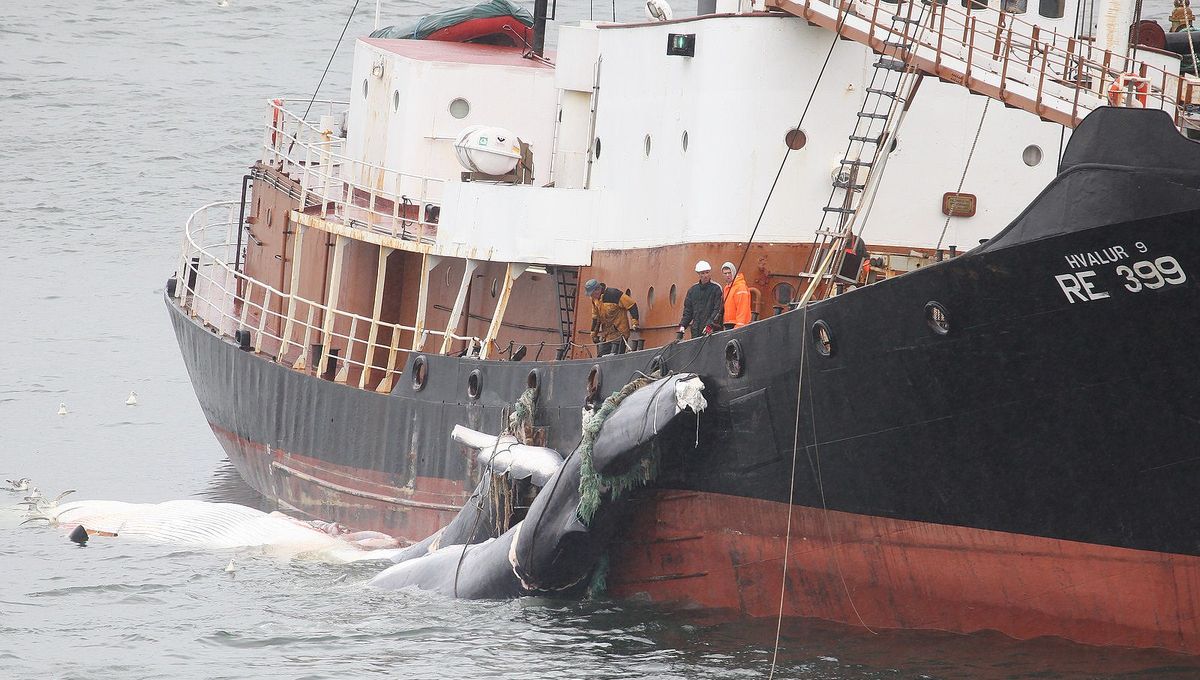
In a shocking step backwards, whaling is set to continue in Iceland. The Icelandic government has announced today that the country’s last remaining whaling company, Hvalur hf., will be issued an annual license to kill 99 fin whales in the Greenland/West Iceland region, as well as 29 whales in the East Iceland/Faroe Islands region.
Although the total quota allocation is 128 fin whales, only the 99 allocated for the Greenland/West Iceland region are targeted by Iceland’s last whaling company, while whales in the Faroes/East Iceland region have not been targeted in the past.
“The world has been watching Iceland, waiting for its government to end whaling once and for all. While the numbers and quota period are significantly reduced, slaughtering 99 more whales makes no sense,” Patrick Ramage, Director of the International Fund for Animal Welfare (IFAW), said in a statement sent to IFLScience.
“It’s hard to fathom how and why this green light to kill 99 fin whales is being given,” added Ramage.
Although Iceland holds an exemption to the moratorium, this is still globally considered an illegal activity.
Sharon Livermore, IFAW
Measuring up to 25 meters (85 feet) in length, fin whales are the second-largest animal on earth in terms of length, second only to the blue whale. These majestic creatures can live up to 90 years old and have a cosmopolitan range across much of the world’s oceans.
While animal welfare and conservation groups have expressed disappointment at the news, they note that this might not necessarily be the worst news possible.
“A small quota might be a necessary evil. Effectively, the whaling law is such that if the minister does reject a quota request, then there’s a possibility that the original quota of 264 fin whales could be carried over into the next season. In that respect, tactically, a small quota could actually work in the favour of the whales,” Sharon Livermore, Marine Conservation Program Director at the IFAW, told IFLScience.
“Whilst the review of the whaling laws is going on, which is due this October, this could be the best approach politically to see the end of commercial whaling in Iceland once and for all,” said Livermore.
In June 2023, Icelandic authorities stopped the year’s whaling season one day before it was supposed to start by suspending the hunting of fin whales until the end of summer. The snap decision came after a damning report published by the Icelandic Food and Veterinary Authority suggested whaling often results in the animals suffering long, agonizing deaths, and may break the country’s animal welfare laws.
The government later lifted the ban towards the end of the season in August, resulting in just 24 fin whales being killed by Hvalur hf. Many hoped that this June, the Icelandic government would not reissue a whaling license to Hvalur hf., which would act as a final nail in the coffin of this dwindling industry.
Alas, this was not the case.
“The whaling issue in Iceland is all about power. Kristján Loftsson, who runs Hvalur hf., is an incredibly powerful and wealthy individual. That is the essence of why commercial whaling is [continuing],” Livermore explained.
Public opinion has shifted in recent years, though. A recent survey found that 51 percent of Icelanders were opposed to the hunt, while 29 percent were in favor. People over 60 were most in favor and those aged 18 to 29 were most against it. Furthermore, demand for whale meat has been on the decline.
Considering this change of heart, many are hoping that Iceland will impose harder laws to outlaw whaling later this year – but nothing is certain.
“Globally, commercial whaling is banned, let’s not forget that. Although Iceland holds an exemption to the moratorium, this is still globally considered an illegal activity. There are lots of reasons why, reputationally, Iceland should strengthen the laws and put a ban on it themselves once and for all,” Livermore concluded.
Source Link: Iceland Decides To Continue Whaling, Issuing Hunting Permits For 128 Fin Whales